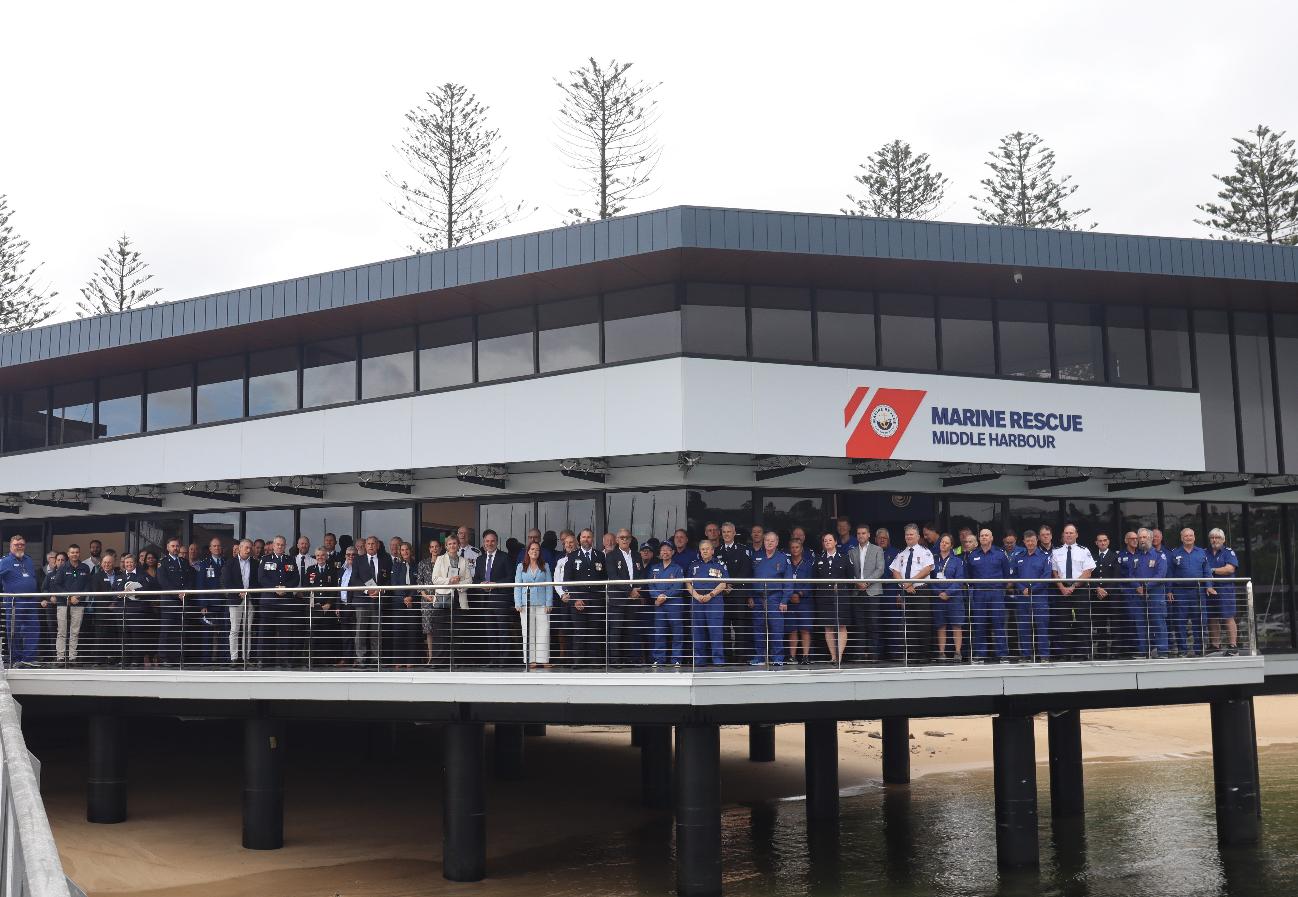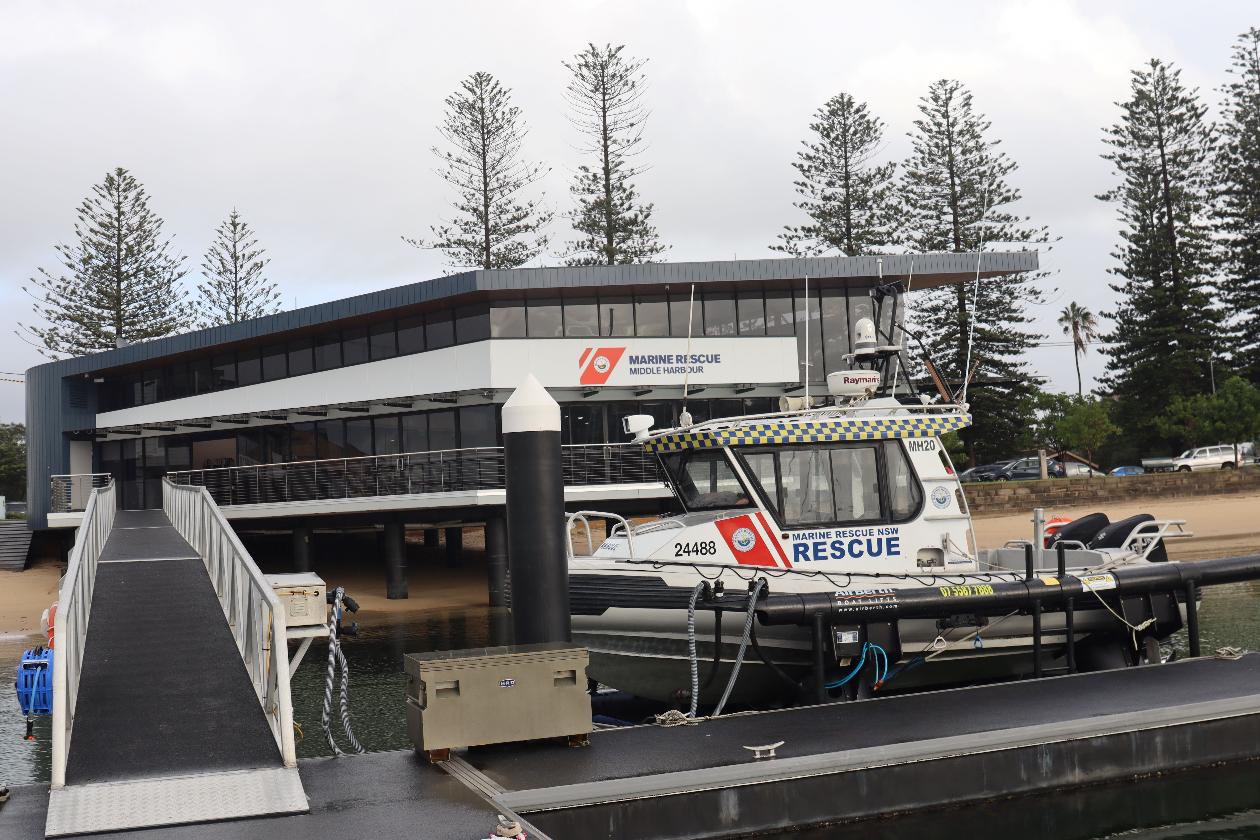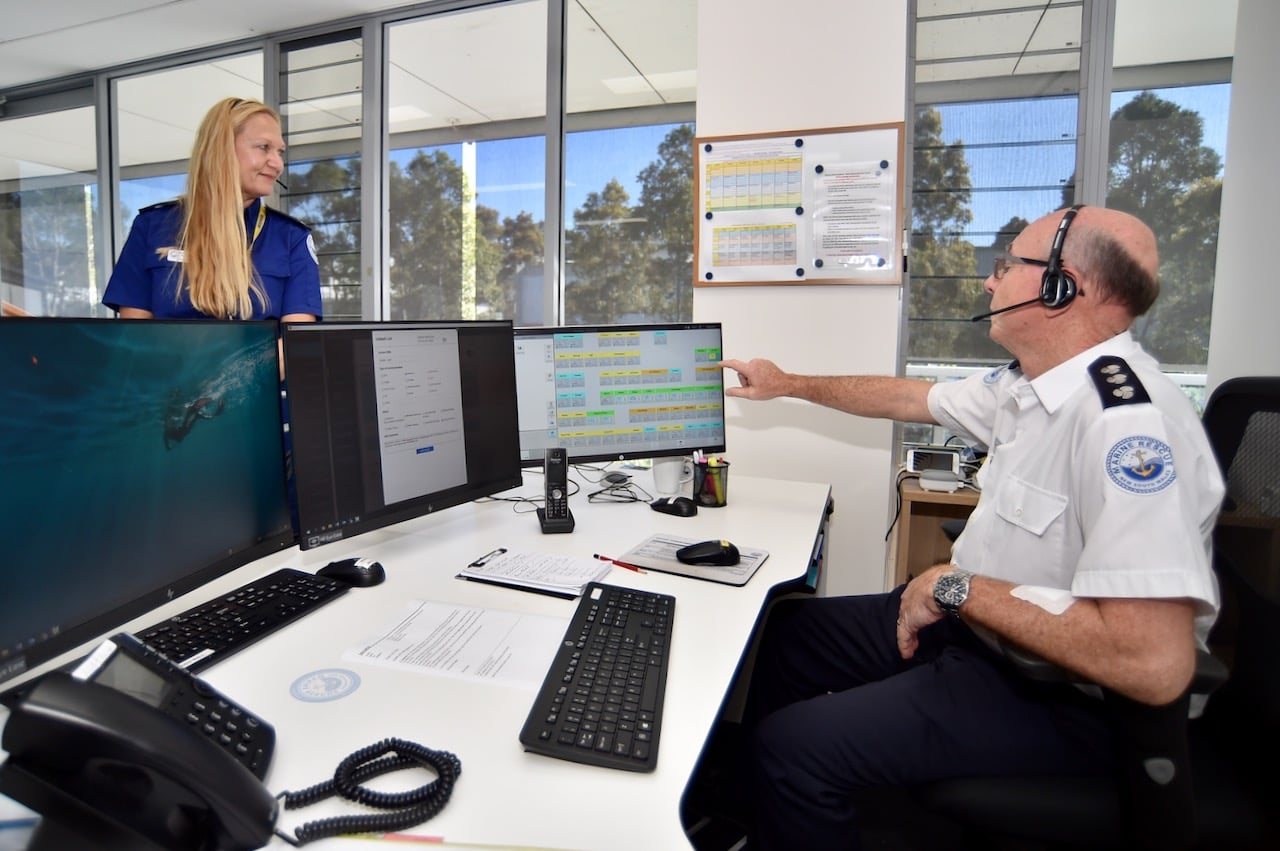Marine Rescue NSW boosts Sydney Harbour rescue capability for peak boating period: Marine Rescue Middle Harbour + Marine Rescue Port Jackson will provide 7-days-a-week duty across December-January

Marine Rescue NSW Acting Deputy Commissioner Dan Duemmer said the service has increased its presence over the peak summer period, with large numbers of recreational boaters expected on Sydney Harbour.
“The Greater Sydney region is the busiest boating area in the state, and volunteers and vessels from either Marine Rescue Middle Harbour at The Spit or Marine Rescue Port Jackson at Birkenhead Point will be on the water for 62 days straight to assist boaters in need, significantly reducing response times.”
“So far this year, volunteers from both of Marine Rescue NSW’s Sydney Harbour-based units have completed 357 search and rescue missions, including 28 emergency responses, and have safely returned 992 people to shore,” Acting Deputy Commissioner Duemmer said.
“More than half of these missions were due to engine and battery failures or running out of fuel.
“Many of these issues are preventable, and we urge all boaters to ensure their vessels are in good working order before heading out and to always carry enough clean fuel with plenty in reserve.
“With the amount of traffic on Sydney Harbour, including large commercial vessels, boaters need to be aware of the dangers if their vessel fails on such a busy waterway,” he said.
Marine Rescue NSW crews from the Middle Harbour and Port Jackson units have four rescue vessels at their disposal, servicing not only the enclosed waters of Sydney Harbour but also having the capability to assist boaters offshore.
“Marine Rescue Middle Harbour’s 11.5-metre Steber and both of Marine Rescue Port Jackson’s Naiad vessels are capable of assisting boaters up to 30 nautical miles (55 km) offshore,” Acting Deputy Commissioner Duemmer said.
Marine Rescue Middle Harbour Deputy Unit Commander Glen Lighton emphasised the importance of safety and weather awareness for boaters.
“Whether heading out on the harbour or offshore, it is vitally important for boaters to carry the correct safety equipment, always wear a lifejacket, and continually monitor the weather.
“A sudden change in conditions can lead to life-threatening incidents, such as capsizing or running aground on rocks.
“Volunteers at Marine Rescue Middle Harbour and Port Jackson are well-trained, highly skilled, and rescue-ready in case a boater needs our help,” Deputy Unit Commander Lighton said.

Acting Deputy Commissioner Duemmer also encouraged boaters to always Log On with Marine Rescue NSW, either via the free Marine Rescue NSW app or marine radio VHF channel 16.
“There is definite room for improvement from the Greater Sydney boating community in Logging On and Off with Marine Rescue NSW.
“Logging On provides details of their trip, and in the event they don’t return as planned, a search can be initiated. Logging On saves precious time in an emergency. It only takes a minute to protect a lifetime,” he said.
Volunteer radio operators and watch officers at the Marine Rescue Sydney State Communications Centre manage radio communications on Sydney Harbour and operate 24/7, 365 days a year.
“Our radio operators are the link between the land and the sea and are often the first voice a boater in distress hears. They play a crucial role in search and rescue responses, and boaters should feel assured that the dedicated team at Marine Rescue Sydney are available round the clock.
“We would like to see all boaters on Sydney Harbour have an enjoyable day on the water and return home safely without incident, in the event they do need assistance our crews from Marine Rescue Middle Harbour and Marine Rescue Port Jackson will rapidly respond,” Acting Deputy Commissioner Duemmer said.
Related - May 2024 report: New Marine Rescue NSW Base Opens At Middle Harbour

Marine Rescue NSW State Communications Centre at Belrose
Log On/ Log Off
Log On & Off with Marine Rescue. It’s quick, simple and free. Log On whenever you’re heading out on the water and Log Off when you return. We’ll stand watch. If you don’t Log Off as planned, our volunteers will start searching for you.
Download from the Apple store Download from the Google play store
To Log On, call your Marine Rescue NSW base on VHF Channel 16 or use the free MarineRescue App. You can download the App at the App Store for Apple devices or Google Play for Androids.
You can always Log On, whether you’re out for a morning’s fishing, a day trip around your local area or cruising along the coastline. And it doesn’t matter if you’re on a tinnie, a cruiser, a yacht, a kayak, a canoe or a jet ski.
When you Log On via, our radio operator will ask you for some basic information about your vessel, your destination and contacts.
You’ll enter the same details on your smartphone or other device if you’re using the MarineRescue app. If you don’t Log Off, this information will help us find you, whether you’ve simply forgotten to Log Off when you returned to shore or you’re caught in an emergency and need help fast.
Tell us:
- Your boat registration number
- Where you’re leaving from
- Where you’re heading
- What time you plan to return
- The number of people on board
- Your mobile phone number
If the fish are biting and you decide to stay out longer, simply call the base on VHF Ch 16 or use the MarineRescue App to update your arrival time.
Remember to Log Off when you’re back on shore. If you haven’t let us know you’re back safely, we’ll start to look for you. We’ll try calling you first up, just in case you’ve forgotten to Log Off and headed home with your catch. That’s the best outcome. If we get no answer, we’ll step up the response.
When you Log On via the App, choose the live safety tracking option so your position is updated in our vessel tracking system every 30 minutes. This means that in an emergency, our rescue crews will have a starting point for a search operation, based on your last known position, saving valuable time when minutes can mean the difference between life and death.
.jpg?timestamp=1631952740047)
Skeds
If you’re travelling along the coastline, we encourage you to establish a voyage plan with Marine Rescue NSW and an offshore tracking schedule for you to check in (to ‘sked’) with our bases along your route. This lets us know that you’re travelling safely, on schedule and not in need of emergency help. We’ll keep track of your progress until you safely arrive at your destination in NSW or we hand you over to the marine rescue service in the next State if you’re travelling further north or south.
Preparing to go on the water
As the skipper, you're responsible for safety of the vessel and people on board. Be prepared to keep everyone safe and enjoy time on the water.
Carry enough lifejackets
Wearing a lifejacket can save your life. Make sure your vessel is carrying enough approved lifejackets for everyone on board. They must be in good condition and quick and easy to access.
Always wear a lifejacket while on the water. This means that you'll be more prepared for unexpected events, such as suddenly falling into the water.
The rules for wearing a lifejacket depend on your vessel, where you are and the level of risk.
Know the rules
Before you go out, make sure you know the rules and regulations for using NSW waterways. Key rules to help you stay safe and avoid collisions including:
- keeping a proper lookout for hazards
- knowing who you must give way to and when
- identifying and obeying navigation marks, lights and sounds
- travelling at a safe speed and keeping a safe distance between your vessel and other people, vessels and objects
- staying under the legal limit for alcohol
- knowing the rules for towing a person on the water and towing a trailer on the road.
Check the weather
Always check the weather before you head out. Be aware of warnings, marine conditions, storms, winds, waves and tides. This can make the difference between an enjoyable day and an emergency situation. If in doubt, don't go out.
Let someone know
Before you leave, contact a friend or relative or use your marine radio to log on with a coastal radio base. Tell them:
- where you're going
- your estimated return time
- your vessel details
- how many people are on board.
Take extra care to let someone know if you are going out alone.
Report in if you extend or change your trip.
You can also use the MarineRescue app to log on and log off with Marine Rescue NSW.
Know what to do in an emergency
Being on the water can be unpredictable and dangerous. Be prepared for an emergency or incident, and know what to do and who to contact if you run into trouble.
If you're involved in or witness an incident, you must always stop and give as much help as possible. Depending on the severity of the incident – for example, if someone is injured – you may need to give information to authorities.
Marine Rescue NSW provides important services, including safety education, marine radio communication, and emergency search and rescue services.
Check your vessel
Check your vessel is in good working order, including the engine and lights. Check you have all the correct equipment on board before you leave home or launch your vessel.
If your vessel is registered, check the registration has not expired.
Check your vessel is suitable for the waterways you want to travel on. For example, if the vessel is designed for enclosed waters, it may not suit open waters or along the coast where waves are larger.
Check all hatches can be opened from both the inside and outside of the vessel. Keep all hatches unlocked while the vessel is underway.
Anyone driving your vessel should have the skills and experience to handle the vessel on the waterway you're using.
Have the correct safety equipment
Check you have the correct safety equipment on board for where you're going and your vessel type.
Make sure every item is in good condition and easy to access. Everyone on board should know its location and how to use it.
Plan where you want to go
Plan where you're going and know how long the trip will take. Be aware of any special waterways or designated areas. Check the location of harbours, ports and potential refuges from bad weather.
Take extra care in cold water, especially alpine waters, where your risk of cold shock and hypothermia are increased.
Build your experience by starting out on calm, quiet waterways. Take a more experienced person with you, if possible.
Make sure you have enough fuel. Plan to use a third to get there, a third to get home, and have a third in reserve for unexpected events.
Make sure you have a compass and up-to-date chart (or map) for the waterways you will be using, especially if you're going out on open waters.
You must have a chart or map if you plan to go out on open waters.
Prepare children
If you're taking children out on your vessel:
- Make sure they have a lifejacket and are wearing it when required.
- Teach them emergency procedures and drills, such as what to do if they fall overboard or the vessel capsizes.
- Show them where the safety equipment is, and teach them how to use emergency items, such as the marine radio, EPIRB and flares. Make sure they understand they must only use them in an emergency.
- Show them how to get in and out of dinghies and small boats while keeping them stable.
- Make sure they do not have any part of their body out of the vessel when it's underway.
- Teach them about keeping a proper lookout and a safe distance from other vessels.
- If you're planning to tow, make sure they know the rules for towing people aged under 16.
- Carry everything they need to be prepared for all types of weather.
- Consider the risk of seasickness, especially if you're going out on choppy water.
- Teach children about lifejackets and sunscreen.
Download boating apps
Boating apps give you quick access to helpful information about waterways on your smartphone or tablet. For example, boat ramps, speed zones, navigation aids, weather, special events and safety advice.
Transport for NSW endorses Deckee, available for free via the Apple Store and Google Play. The Deckee app includes maps showing boat ramps, speed zones, navigational aids. It also has access to a live data feed from Transport for NSW that captures alerts, marine notices and campaigns.
Marine Rescue NSW
Marine Rescue NSW is the State’s official volunteer marine rescue service. The Marine Rescue App allows you to register details of your next boating trip.